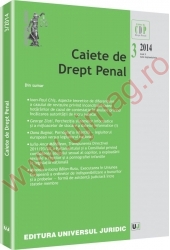Transpunerea Directivei 2011/93/UE a Parlamentului şi a Consiliului privind combaterea abuzului sexual a copiilor, a exploatării sexuale a copiilor şi
Transposition of Directive 2011/93/EU of the European Parliament and of the Council of 13 December 2011 on combating sexual abuse and sexual exploitat
Author(s): Iulia-Anca MăhăleanSubject(s): Law, Constitution, Jurisprudence
Published by: Universul Juridic
Keywords: New Criminal Code; child pornography; recruiting children for sexual purposes; pornographic performance; sexual abuse and sexual exploitation of children; knowingly obtaining access to child pornography; age of sexual consent.
Summary/Abstract: The necessity for an efficient framework on combating the sexual abuse and sexual exploitation of children and child pornography and the lack of sufficiency achieved by the Member States alone, needed an intervention at Union level, considering the reason of scale and effects. The European Parliament and the Council of the European Union, adopted as a result, the Directive 2011/93/EU that aims to amend and expand the provisions of Framework Decision 2004/68/JHA, and can therefore be considered a crucial step in ensuring the consistency of legislation on substantive criminal law in this field. The European legal instrument takes into consideration that serious forms of sexual abuse and sexual exploitation of children should be subject to effective, proportionate and dissuasive penalties, an objective that requires a comprehensive approach covering the prosecution of offenders, the protection of child victims, and prevention of the phenomenon. In addition, it criminalizes various forms of sexual abuse and sexual exploitation of children which are facilitated by the use of technology, knowingly obtaining access to child pornography, and refers to acts related to pornographic performance. The Romanian legislator complied with the European standards by introducing most of the various forms of sexual abuse and exploitation in one legislative act, the New Penal Code, in order to ensure it’s coherence. Although there are notable changes made by the legislator in order to achieve the objectives set out by the Directive, there is no doubt that there are still some important acts of sexual abuse and exploration that have no correspondent in the internal legislation. The reason why these discrepancies are present is due to the fact that European Directive is a legal instrument that includes new forms of criminalization, that are a result of evolution, forms that could not have been predicted in the internal legal system.
Journal: Caiete de drept penal
- Issue Year: X/2014
- Issue No: 03
- Page Range: 61-77
- Page Count: 17
- Language: Romanian
- Content File-PDF

